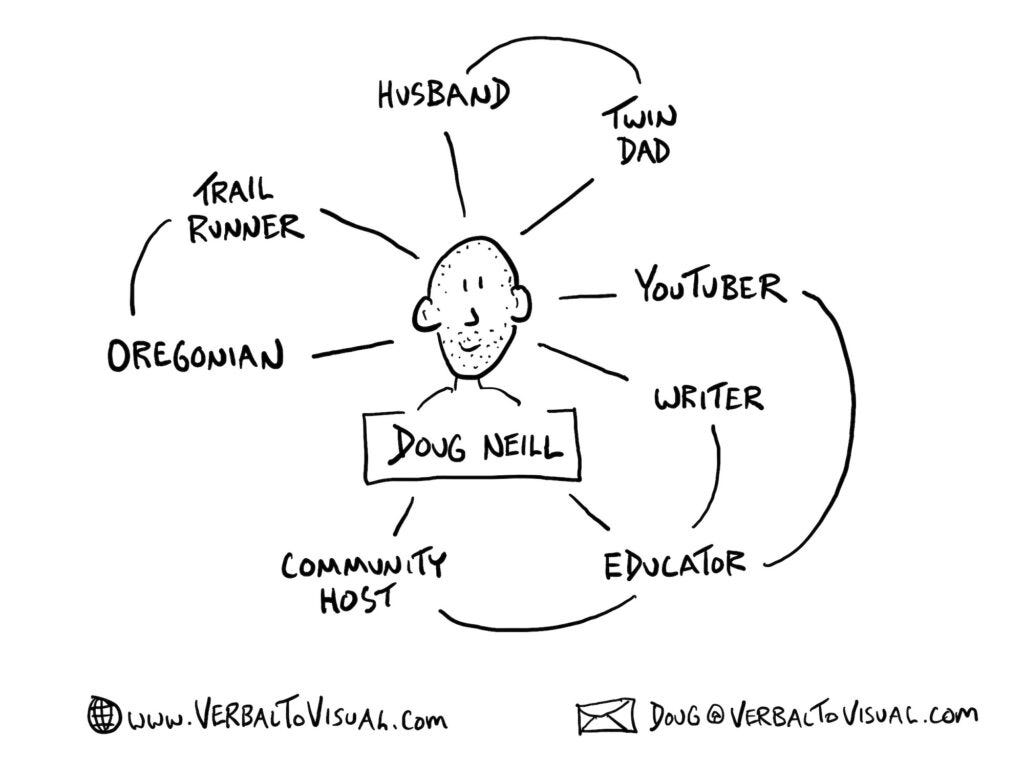A Sacred Alchemy
Linda Sohn | My Networked Self and workfutures.io | Factoids
I now approach my domestic labor differently. While I used to consider the work I needed to do around the house utterly expendable, I now see it as integral for my and my family’s happiness. Through my body’s daily offering, I bear witness to the belief that my private sphere is just as worthy of my attention as my public sphere and that my inner life is just as worthy of my care and labor as my outer one. And with each sock I put away, I trust that a sacred alchemy is unfurling.
| Lydia Sohn, The Sacred Appeal of Household Labor
To pull the most telling line:
With each sock I put away, I trust that a sacred alchemy is unfurling.
My Networked Self and workfutures.io
I wrote a post at workings.co, The Man Behind The Curtain, where I applied a charting (and thinking) technique attributed to philosopher Kathleen Wallace known as the ‘networked self’. The immediate source of inspiration was a post from Doug Neill, who developed one for himself:
He also explained its benefits:
It helps you to not overweight a single identity as you think about how your life is going right now – even if one identity feels stagnant, others might be going great.
It encourages you to make connections that you might have otherwise missed between your different identities.
It opens up the door for you to lean into a newer or neglected identity that you’d like to prioritize in the coming months.
I won’t recap the entirety of The Man Behind The Curtain, but let me share my networked self chart and a sunburst chart derived from it. These represent my current modus operandi: my passions, aspirations, and plans.
A connection of Doug’s paired the major aspects of her networked self with the lines of a Gantt chart. I thought the hierarchical and circular representation of a sunburst chart worked better for me.
What this means for workfutures.io.
As I wrote in The Man Behind The Curtain,
As you can see, workfutures.io, my newsletter dedicated to ‘The economics and ecology of work, in a time of accelerating uncertainty in our lives, society, and business’, takes up the largest single tranche of my time and focus. My intention going forward is to focus in three broad areas:
First, putting ‘the future of work’ (a wildly overused but generally not well defined expression) into the context of workfuture.io’s tagline, specifically focused on the economics of work and its integration into society, politics, and institutions.
Second, I want to help others to ‘see the way’, by which I mean sharing my perceptions and reasoning about what forces are involved in work, ranging from science (like psychology, behavioral economics, and anthropology), to politics (like unionization, worker’s rights, and antitrust), and the challenges and possibilities of technologies for work (like AI, and communication and coordination tools).
Last of all, ‘futures thinking’: I want to provide theory and tools for thinking into the future, with work as a principal target.
I’ll be pushing ahead on all three workfutures.io fronts.
In the near term, I won’t be pursuing writing various books that I’ve mentioned in the past months and years. Instead, I will undertake something much more accessible, shorter, and easier to absorb: instead of a dissertation, think of a 5,000 word essay on a specific work-related topic, such as workplace surveillance, the emergent organization, or the urban doom loop. I will be trying to write these ‘booklets’ one or two per quarter. These will be available to supporters (paid subscribers), although I will summarize them for all.
…
I’ve taken a good deal of time off in the past month or so, primarily involved in recentering myself around the underlying goals of my research, writing, and the other, inner half of my sunburst. Working on that sacred alchemy Lydia Sohn wrote about in the opening quotation.
Factoids
Europe has fallen behind, says Mario Draghi.
In the 1980s, when the single market was taking shape, Italy’s economy was about as big as China’s and India’s combined. | Enrico Letta
But things have changed, and Europe has fallen way behind.
The Draghi report says Europe will have to dramatically increase investment -- by $900B per year -- to regain its competitiveness. | Gross, Cohen
Will they be able to? Will they agree to? I am betting no.
…
Fertility is falling everywhere.
Every country in the world has a lower fertility rate now than in 1950.
| Hunter
This has profound effects in the world of work.
…
Battery prices are falling fast.
Battery prices have fallen by more than half in just 18 months.
Side-effects of turbines.
Engineers expect more than 43 million tons of landfill waste will be generated by turbine blades globally by 2050, which is about three times as much total waste as New York City produces annually. | Minho Kim
But researchers have developed recyclable blades made from 'inedible sugar extracted from wood, plant remains, used cooking oil and agricultural waste' instead of fiberglass and plastic.
…
Mind wandering.
Researchers have found that we’re more likely to overcome a relational or work-related impasse not when we are hunched over our desks in rapt concentration or collaborating in a Zoom meeting, but rather on breaks when we do boring activities or when our minds wander. Approximately one-fifth of our most creative ideas emerge during those times.
Lydia Sohn, again.



